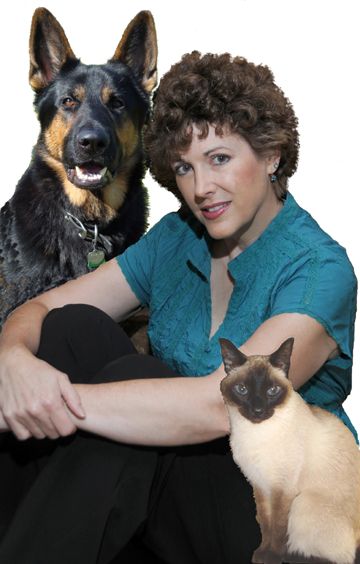Ark Animals is happily part of the Golden Moments Senior Pet Blog Tour which is helping Amy Shojai to promote her books, Complete Care for Your Aging Cat and Complete Care for your Aging Dog.
As part of the tour my subscribers were offered the opportunity to send Amy Shojai some of their questions.
In fact, Amy went wild in answering them and so we had to split this initial post into two parts! This is part two of Senior Pet Questions & Answers.
Many of the questions are explored in more detail in Complete Care for Your Aging Cat and Complete Care for your Aging Dog and the works also include advice directly from veterinarians and other experts.
Please note ©Amy Shojai, 2010. Amy Shojai is NOT a veterinarian and is here to share share her experience, along with recommendations gleaned from other experts.
We hope you will find this series of interest and will be motivated to purchase her works about aging pets and senior pets which have recently been made available in ebook format.
Does Proin® work as well on males as females? Does twice a day work better?
Proin® is a supplement that contains phenylpropanolamine (PPA) and is prescribed to help manage urinary incontinence (dribbling) in dogs. I’m not aware that it has any extra benefit for females over males. That said, the old spayed girls have a much higher incidence of urinary incontinence than the old fogie boy dogs. As the dog ages, estrogen (or testosterone for boys) levels drop and they lose bladder tone. It’s similar to what happens with menopausal women. Proin is designed to help tighten the bladder sphincter to control dribbling. It can take several days of treatment before you’ll see results, and stopping treatment can cause a relapse. You’ll need to follow the veterinarian’s advice regarding dosage and timing.
How do I strengthen my cat’s immune system? I want to know what supplements my 16-year-old cat should be taking, especially now that we are going into cold weather. Also, do you have any diet suggestions?
How well your cat’s immune system works is dictated by genetics, but also influenced throughout life by nutrition, stress, and exposure to pathogens. By age seven, the cat’s immune system changes. The thymus gland helps new immune cells mature, but creation of these new cells slows down with age. Production declines of the chemicals such as interferon and interleukins that help control the immune system’s response. As a result old cats get sick quicker and have more trouble recovering.
Honestly, I don’t know of any supplements or magic bullets that specifically benefit the immune system, although there are issues that negatively affect immunity. Holistic veterinarians believe massage has a positive influence on immunity, and certain acupuncture points impact function of various organs. Highly processed commercial diets create byproducts said to negatively impact the immune system over time, while “natural” foods offer less strain.
Probably the best way to boost or strengthen your cat’s immune system—or at least take off some of the burden—is to keep stress to a minimum. It’s vital that old cats eat a very high quality, very digestible diet with the right amount of protein. Old cats lose muscle mass unless they get enough protein, and muscles help keep them healthy. A commercial food designed for “senior” cats can be a good choice. If you home cook for your cat, confer with your vet and/or a vet nutritionist (PetDiets.Com is a great resource) to offer a good formula.
Are there things to consider when you are playing with an older dog? For example, is it possible to train its mind and body without overestimating him, especially considering his joints?
That’s a fantastic question! Yes, you can still play with older dogs without over-reaching his abilities and causing injury. This depends on the size of the dog and his likes/dislikes. Find something that he’s always enjoyed—maybe that’s “fetch” or “catch” for example. Rather than throwing the Frisbee overhead for him to leap upwards, keep it low to the ground. Roll the ball along the grass instead of lobbing it across the field. Lower the height of hurdles for the agility champ so he still can go through the exercise. A fantastic exercise for dogs with achy joints (if you have the facility) is swimming. The water supports the dog’s weight and takes the strain off the joints, while allowing him to exercise. Of course, swimming appeals more to some dogs than others so you’ll need to fit the game to your dog.
Remember, too, that exercising the mind is just as important and can help prevent or at least slow the onset of cognitive dysfunction (doggy/kitty Alzheimer’s). Practicing tricks and obedience commands works great, or giving your pet puzzle toys to figure out.
Any steps I should be taking now to ensure long-term health for my two-year-old dog that will help when he is senior dog?
Keeping your dog (or cat) at a healthy weight, or even slightly underweight, will extend his life by as much as two years, according to several studies. Preventing injuries and illness, feeding the best nutrition you can, and offering preventive care and prompt medical intervention when needed over his lifetime is the best health care you can provide. Oh, and love him every day, like it’s the last day—you’ll thank me later for that one.
How do you know when it is time to euthanize a senior pet?
Oh my dear, there is no good answer to this question. It is different for every pet and owner. Remember that your cat/dog loves you and trusts you to make this most awful and loving choice for him. Ask yourself—is today a good day, or a bad day? Can I reasonably expect tomorrow to be the same, better or worse? Does he still eat and enjoy meals? Does my cat still groom herself? Is medical treatment interfering with the bond you share (cat hides from you/dog reluctant to interact because of pilling). When a longer life isn’t necessarily a better life, when the bad days outweigh the good ones—talk with your veterinarian about euthanization. And then trust your decision. Any decision you make with love in your heart cannot be wrong.
 About the Guest Blogger: Amy Shojai (CABC) is a certified animal behavior consultant and author of 23 pet care books. She’s a spokesperson to the pet products industry, a columnist at About.com and CatChow.com, and appears as an expert on Animal Planet’s Cats 101 and Dogs101. She is also the host of Pet Peeves radio show on PetLifeRadio.com. You can learn more about her at the Amy Shojai website.
About the Guest Blogger: Amy Shojai (CABC) is a certified animal behavior consultant and author of 23 pet care books. She’s a spokesperson to the pet products industry, a columnist at About.com and CatChow.com, and appears as an expert on Animal Planet’s Cats 101 and Dogs101. She is also the host of Pet Peeves radio show on PetLifeRadio.com. You can learn more about her at the Amy Shojai website.



Wow! My Boston Terriers are 8, guess I need to read this book. I just don’t want to think about their aging mostly. You know we want them to be here forever! ;o)
Hi Melissa, It’s always true that we don’t want to think of our pets as “old fogies” (I don’t want to think of myself that way, either, LOL!). But we CAN help keep them young. I hope you enjoy the book.
Thanks again for hosting me on the Golden Moments Senior Pet Blog Tour! I’ll check in again later tonight…I’m at a writer conference with lots of pets too….and am late for a meeting. Woofs & purrs, amy